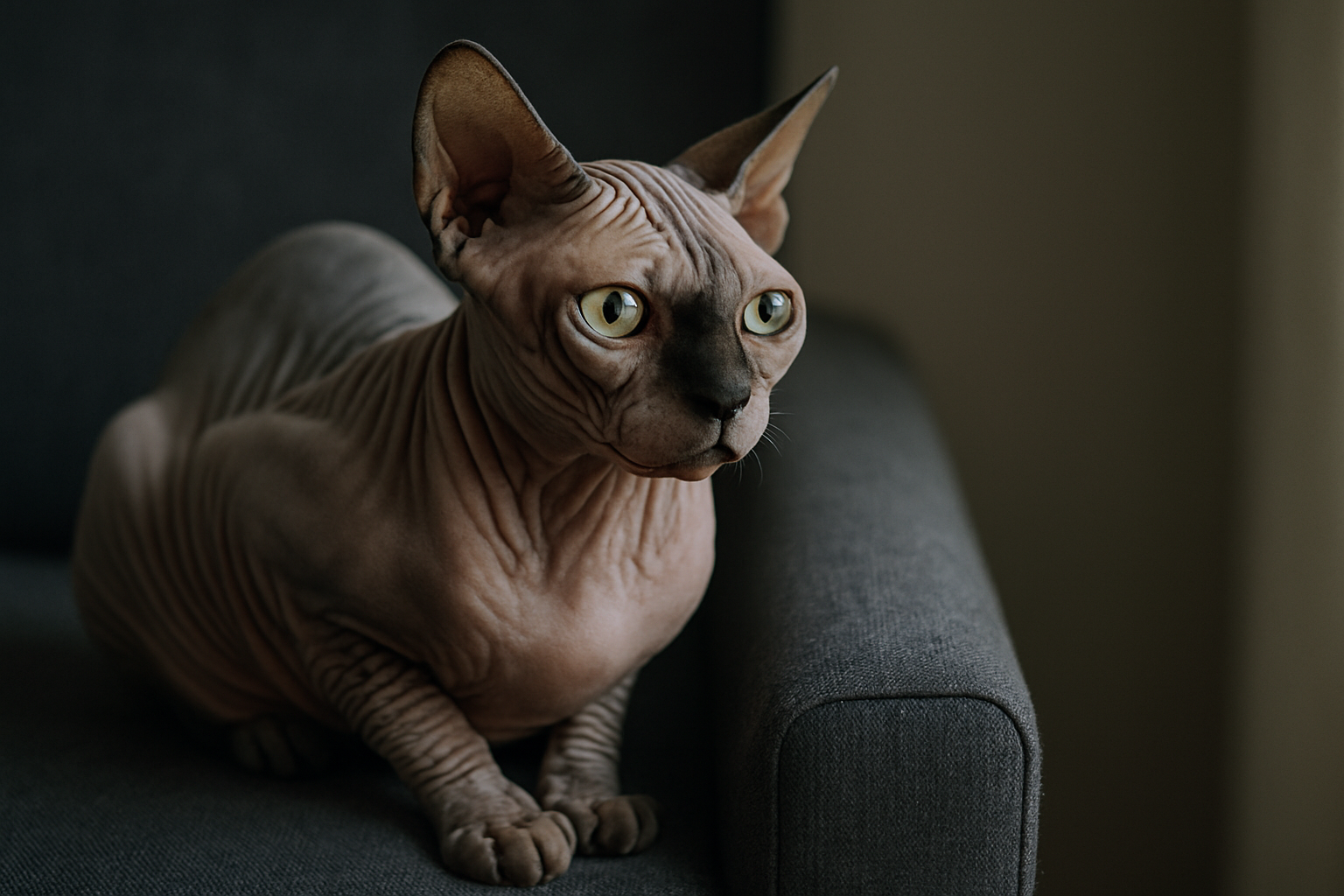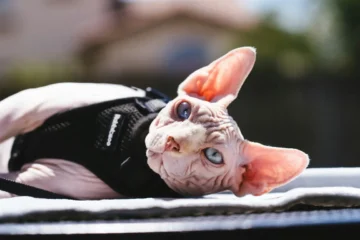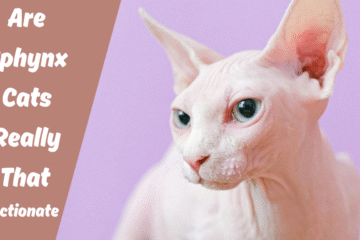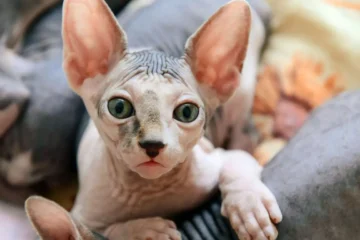If you own a Sphynx cat, you probably already know they’re not like other cats. These hairless beauties are basically the golden retrievers of the cat world – they want to be with you all the time, they’re super social, and they can get pretty upset when things don’t go their way.
But here’s the thing: this same loving, people-obsessed nature that makes Sphynx cats so special also makes them way more likely to develop anxiety issues. If you’ve noticed your Sphynx acting weird lately, you’re not alone. Many Sphynx owners deal with anxiety problems in their cats, and the good news is that once you know what to look for, you can help your furry (well, hairless) friend feel better.
What Makes Sphynx Cats Different When It Comes to Anxiety
Think about it this way – most cats are pretty independent. They love you, but they’re also fine doing their own thing. Sphynx cats? Not so much. They’re like that friend who texts you “what are you doing?” every five minutes. They need constant attention, love being the center of your world, and get genuinely upset when they’re not included in everything you do.
This intense need for human connection means that when something disrupts their routine or makes them feel insecure, they don’t just shrug it off like other cats might. Instead, they can develop real anxiety issues that affect their behavior, health, and overall happiness.
Plus, being hairless isn’t just about looks – it affects how they feel physically too. They get cold easier, need more attention to their skin, and are generally more sensitive to their environment. All of this can add up to a cat that’s more prone to stress and anxiety.
How to Tell If Your Sphynx Cat Has Anxiety (The Real Signs)
The Obvious Signs Everyone Notices
They Won’t Stop Meowing Okay, Sphynx cats are chatty by nature, but if your cat suddenly sounds like they’re having a full conversation with you every time you move, that’s different. Anxious Sphynx cats will meow excessively, especially when they think you’re about to leave or when something in their environment changes.
Bathroom Problems This one’s gross but important – if your normally well-behaved cat starts peeing or pooping outside the litter box, anxiety might be the culprit. They’re not being spiteful; they’re stressed out. Often, they’ll go on your bed or clothes because those things smell like you and make them feel safer.
Turning into a Tiny Tornado Some anxious Sphynx cats become destructive. They might scratch your furniture more than usual, knock things off counters, or even chew on things they shouldn’t. It’s like they have all this nervous energy and nowhere to put it.
Eating Weirdness Stress affects appetite, and you might notice your Sphynx either stops eating their favorite food or becomes obsessed with eating everything in sight. Some cats stress-eat just like people do.
The Sneaky Signs You Might Miss
Becoming a Velcro Cat If your already-clingy Sphynx becomes impossibly clingy – like following you to the bathroom and having a meltdown when you close the door – that’s anxiety talking. They’re basically saying, “Please don’t leave me, I can’t handle it.”
Turning into a Hermit On the flip side, some anxious Sphynx cats do the opposite and start hiding. This is weird for a breed that normally wants to be in the middle of everything, so if your social butterfly suddenly becomes a recluse, pay attention.
Getting Snappy Anxiety can make even the sweetest Sphynx cat a bit aggressive. They might hiss at visitors, swat at you when you try to pet them, or just seem generally grumpy. They’re not being mean – they’re scared and overwhelmed.
Weird Repetitive Stuff Some cats develop odd habits when they’re stressed, like excessive grooming (even though they barely have fur to groom), pacing around the house, or obsessively scratching at the same spot on a wall.
Sleep Problems Just like anxious humans, anxious cats can have trouble sleeping. They might be restless at night, wake up frequently, or sleep way more than usual during the day.
Why Do Sphynx Cats Get Anxious? The Common Triggers
Being Left Alone (The Big One)
This is probably the number one cause of anxiety in Sphynx cats. These guys were basically bred to be companion animals, and when you leave them alone for long periods, they can have what’s essentially a panic attack. It’s not just missing you – it’s genuine distress.
Changes in Their World
Sphynx cats like things to stay the same. Moving furniture around, bringing home a new pet, having relatives visit for the holidays, or even changing your work schedule can throw them off. They’re creatures of habit, and disruptions to their routine can cause real anxiety.
Boredom and Lack of Stimulation
These are smart, active cats. If they don’t have enough to do, they can work themselves into an anxious state. Think of it like a really energetic kid who’s been stuck inside all day – they need outlets for their energy and intelligence.
Not Enough Social Time
Even if you’re home, if you’re not actively engaging with your Sphynx cat, they can get anxious. They don’t just want to be in the same room as you – they want to interact with you.
Health Issues
Sometimes what looks like anxiety is actually your cat not feeling well. Pain, illness, or discomfort can make cats act anxious, so it’s always worth checking with your vet if the behavior is sudden or severe.
How to Help Your Anxious Sphynx Cat Feel Better
Make Your Home a Safe Haven
Create Cozy Hideouts Even though Sphynx cats are social, they still need places where they can feel completely safe. Set up comfortable spots with soft blankets (they love warmth!) in quiet areas of your home. Make sure these spots are always available and never disturbed.
Keep Things Predictable Try to feed your cat at the same times every day, keep their litter box in the same spot, and maintain regular routines as much as possible. Predictability is like a security blanket for anxious cats.
Temperature Matters Remember, your Sphynx gets cold easily. Keep your home at a comfortable temperature, provide warm bedding, and maybe even consider getting them some cute cat sweaters for chilly days. A cold cat is a stressed cat.
Keep Them Busy and Happy
Play Time is Medicine Tired cats are usually calmer cats. Spend time every day actively playing with your Sphynx using interactive toys, laser pointers, or feather wands. This helps burn off nervous energy and gives them something positive to focus on.
Puzzle Feeders and Interactive Toys Instead of just putting food in a bowl, try puzzle feeders or treat-dispensing toys. This gives your cat’s brain something to do and can help reduce anxiety-driven behaviors.
Rotate Toys Keep things interesting by rotating which toys are available. What seems new and exciting can help prevent boredom-related anxiety.
Address Separation Anxiety
Practice Short Departures If your cat freaks out every time you leave, start with very short absences and gradually increase the time. Leave for just a few minutes at first, then slowly work up to longer periods.
Make Leaving and Returning Low-Key Don’t make a big deal about leaving or coming home. The more dramatic you make it, the more anxious your cat will become about these transitions.
Consider a Companion Many Sphynx cats do better with a friend. If you’re able to care for two cats, a companion can really help with separation anxiety.
Natural Ways to Calm Your Cat
Pheromone Products There are special diffusers and sprays that release calming pheromones (basically chemical signals that say “everything is okay”). Many cat owners swear by these, and they’re completely safe.
Calming Music Believe it or not, there’s actually music made specifically for cats. Soft, soothing sounds can help create a more relaxed environment.
Herbal Remedies Some natural supplements like chamomile or valerian can help with mild anxiety. Always check with your vet before trying any supplements, though.
Massage and Gentle Touch Many Sphynx cats respond well to gentle massage or petting. The physical contact can be very soothing for anxious cats.
When It’s Time to Call the Vet
Red Flags That Need Professional Help
If your cat’s anxiety is severe, sudden, or includes any of these signs, it’s time to talk to your vet:
- Refusing to eat for more than a day
- Aggressive behavior that’s dangerous to people or other pets
- Constant hiding or complete withdrawal from family
- Excessive vocalization that goes on for hours
- Destructive behavior that’s damaging your home
- Any bathroom problems that persist despite trying other solutions
Medical Options That Actually Work
Your vet might suggest prescription medications for severe anxiety. These aren’t “doggy downers” – they’re legitimate treatments that can help your cat feel better while you work on behavioral solutions.
Common medications include:
- Anti-anxiety drugs for ongoing issues
- Short-term medications for specific situations (like vet visits or travel)
- Natural supplements that support calm behavior
Learn more about feline health conditions at the Cornell Feline Health Center.
Finding a Cat Behavior Expert
If regular training and environmental changes aren’t working, a certified cat behaviorist can help. These professionals specialize in understanding why cats behave the way they do and can create customized plans for your specific situation.
Preventing Anxiety Before It Starts
Set Your Kitten Up for Success
If you’re getting a Sphynx kitten, early socialization is huge. Expose them to different people, sounds, and experiences in a positive way while they’re young. This helps them grow up confident and less likely to develop anxiety issues.
Maintain Their Health
Regular vet check-ups can catch health issues before they contribute to anxiety. A healthy cat is generally a calmer cat.
Create a Stable Environment
Try to minimize major changes in your home when possible. When changes are necessary, introduce them gradually and provide extra attention and comfort during transition periods.
Learn Your Cat’s Language
The better you understand your individual cat’s personality and preferences, the better you can respond to their needs before small stresses become big anxiety issues.
The Bottom Line on Sphynx Cat Anxiety
Here’s the truth: Sphynx cats are amazing companions, but they’re also more emotionally complex than your average cat. Their anxiety isn’t a character flaw or something you caused – it’s just part of how they’re wired. The good news is that with some understanding, patience, and the right approach, most anxiety issues can be managed successfully.
Remember that every cat is different. What works for your friend’s Sphynx might not work for yours, and that’s okay. The key is paying attention to your cat’s individual needs and being willing to try different approaches until you find what helps them feel secure and happy.
Most importantly, don’t feel guilty if your Sphynx cat has anxiety issues. These cats form incredibly strong bonds with their owners, and sometimes that intensity comes with challenges. The fact that you’re reading this and looking for solutions shows you’re exactly the kind of caring owner your cat needs.
With time, patience, and maybe some help from your vet, you can help your Sphynx cat live a calmer, happier life. And honestly, the effort is worth it – there’s nothing quite like the love and devotion of a content, well-adjusted Sphynx cat.




